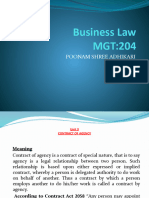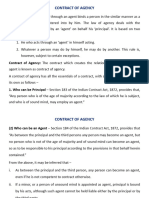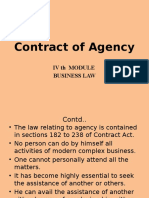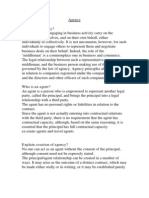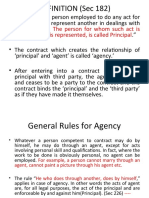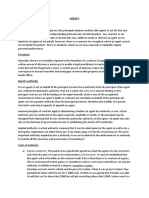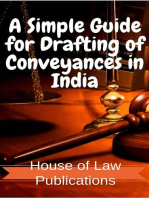0 ratings0% found this document useful (0 votes)
8 viewsLaw of Agency
Law of Agency
Uploaded by
aayushgoel2007Copyright:
© All Rights Reserved
Available Formats
Download as PDF, TXT or read online from Scribd
Law of Agency
Law of Agency
Uploaded by
aayushgoel20070 ratings0% found this document useful (0 votes)
8 views17 pagesOriginal Title
22. Law of Agency.pptx
Copyright
© © All Rights Reserved
Available Formats
PDF, TXT or read online from Scribd
Share this document
Did you find this document useful?
Is this content inappropriate?
Copyright:
© All Rights Reserved
Available Formats
Download as PDF, TXT or read online from Scribd
Download as pdf or txt
0 ratings0% found this document useful (0 votes)
8 views17 pagesLaw of Agency
Law of Agency
Uploaded by
aayushgoel2007Copyright:
© All Rights Reserved
Available Formats
Download as PDF, TXT or read online from Scribd
Download as pdf or txt
You are on page 1of 17
THE LAW OF AGENCY
What a person does by another, s/he does by
himself. ------
The law of agency is based on this
Principle.
Agency Defined
An agent is
a person employed
to do any act for another person, or
to represent another in his dealings with
third persons.
The person for whom such an act is done or
who is so represented is called the principal.
(S 182)
General Rules Governing An Agency
• Whatever a man sui juris
i.e., what ever, a person competent to
contract, may lawfully do by himself, s/he may
also do by an agent.
.
• ‘Maxim qui facit per alium facit per se’ i.e.,
He who acts through an agent is himself
acting.
.
Essentials of Agency
1. Intention and Power to Act on Behalf of
the Principal
2. Capacity of the Parties
As per Section 183, ‘Any person who is of the
age of majority according to the law to which he is
subject, and who is of sound mind, may employ
an agent.’
3. Consideration Not Necessary
Section 105 clearly provides, ‘No consideration is
necessary to create an agency.’
MODES OF CREATION OF AGENCY
The law recognizes various modes to create a
contract of agency, namely:
• Agency by express agreement
• Agency by implied agreement
• Agency by ratification
• Agency by operation of law
Express Agency
• A contract of agency may be made through an express agreement
between a principal and his/her alleged agent. The said agreement
may be oral, or in writing. The agency so created is called ‘express
agency’. Section 187
• The usual form of a written contract of agency is the Power of
Attorney.
• An oral appointment is also valid even though the contract which
the agent is authorized to make has to be in writing [Heard vs
Pilley].
For example, A of Delhi appoints B of Mumbai by a deed (power
of attorney) to sell the goods supplied from his Delhi office in
Bombay and adjoining areas on commission basis. In this way an
agency relationship has been created between A and B through
an express agreement.
Implied Agency
• A contract of agency may be implied from the
circumstances of the case, things spoken or written, or
the ordinary course of dealing.
For example, a solicitor, or counsel engaged to
conduct litigation, may have the implied authority to
compromise the suit.
Similarly, a husband who lives with his wife impliedly
authorizes her to pledge his credit for necessary
household expenses.
• An Implied agency may take the following three
distinct forms:
• Agency by Estoppel;
• Agency by Holding out; and
• Agency by Necessity
Agency by Estoppel
• Estoppel arises when someone is stopped or precluded from
denying the truth of anything that he has represented by his
words or conduct as a fact, although such a state of thing
did not exist at all.
• When an agent has, without authority, done acts or
incurred obligations to third persons on behalf of his
principal, the principal is bound by such acts or obligations,
if he has by his words or conduct induced such third
persons to believe that such acts and obligations were
within the scope of the agent's authority. S 237
Anil tells Babita in presence and within hearing distance of
Pooja that he is Pooja's agent. Pooja does not contradict the
statement. Later on Babita enters into a contract with Anil,
honestly presuming that Anil is Pooja's agent. Pooja will be
bound by this contract for there is an agency by Estoppel
between her and Anil.
Agency by Holding Out
• The doctrine of 'holding out' is also based on the principal of
Estoppel.
• The alleged principal by his/her words or conduct willfully leads
another person to believe that the alleged agent is representing
him. If someone enters into a contract with the person so
representing on that belief, then the person so represented (i.e.,
the alleged principal) is stopped from denying the truth of such
statements subsequently.
• For example, P allows his servant to purchase certain goods from
B's shop on credit and later on he pays for the goods. It is repeated
many times. Later on, when the servant was not in P's
employment, he purchased goods on P's credit from the same
shop and disappeared. B can recover the price from P on the basis
of the doctrine of holding out.
Agency by Necessity
• Sometimes, owing to the exigencies of circumstances,
a person may be compelled to act as an agent to the
other without requiring or seeking the consent of the
latter. Such an agency is called the agency by necessity.
• In Sims & Co. vs Midland Rly. Co., Butter was consigned
with the defendant railway company. The goods being
perishable was becoming useless owing to delay in
transit and was therefore disposed of by the station
master for the best price available as it was not
possible to obtain instructions from the principal, the
sale was held binding on the owner. The company's
action was justified on the ground of unforeseen
emergency, arisen in the course of transit.
Agency by Ratification
• Where a person without being authorized to do so,
purports to act as agent, or a duly authorized agent
acts beyond his/her authority, the principal may
elect to ratify or disown such acts. If he chooses to
ratify the agent's transactions supposedly based on
his behalf, an agency by ratification arises.
• The effect of ratification is that it renders the
ratifier (i.e., the principal) bound to the contract as
if he had expressly authorized the person to
transact the business on his behalf.
• An agency by ratification is also known as ex post
facto agency i.e., agency arising after the event.
Agency by Operation of Law
• An agency, under certain circumstances, also comes
into existence by operation of law. Such an agency
comes into existence neither by an express agreement
nor by Estoppel and ratification, but by the provisions
of law of land.
• Partnership firm is a universal example of this type of
agency. When a partnership is formed, every partner,
by operation of law, automatically becomes the agent
of other partners and the firm.
• Similarly, the promoters becomes agents of the
company they promote, MPs and MLAs become
agents of their respective constituencies, ministers
become agents of governments and so on.
RIGHTS OF AN AGENT
1. Right to Remuneration (Section 220).
2. Right of Retainer (Section 217). An agent may retain, out of any
sums received on account of the principal in the business of the
agency the following:
– all moneys due to him/her in respect of advances made;
– expenses properly incurred by him/her in conducting such business; and
– such remuneration as may be payable to him/her for acting as an agent
[Section 217].
3. Right of Lien [Section 221]. An agent is (unless otherwise agreed)
entitled to a lien on all property (including papers) of the principal,
which has come into his/her possession in the course of the agency.
4. Right to be Indemnified against Consequences of Lawful Acts
[Section 222]. The employer of an agent is bound to indemnify
him/her against the consequences of all lawful acts done by such
agent in exercise of the authority conferred upon her/him.
RIGHTS OF AN AGENT
5. Right to be Indemnified against Consequences of Acts done in Good Faith [Section
223]
An agent's right to be indemnified also extends for the consequences of the acts done
in good faith even though they turn out to be injurious to the rights of third persons.
6. Right to compensation [Section 225]
An agent is also entitled to compensation in respect of injury or loss suffered by
him/her due to the principal's neglect or want of skill. For example, A employs B as a
bricklayer in building a house, and puts up the scaffolding himself. The scaffolding is put
up unskillfully and B is hurt. A must make compensation to B.
DUTIES OF AN AGENT
1. Duty to Act within the Scope of the Authority . The first and foremost
duty of every agent is to act within the scope of the authority conferred
upon him/her.
2. Duty to Follow Instructions or Customs [Section 211] . An agent is
bound to strictly carryout the instructions of the principal. In the
absence of express instructions, s/he must follow the prevailing
custom in the same kind of business at the place where the
agent conducts the business.
3. Duty to Act With Due Care and Skill [Section212] . An agent is bound to
conduct the business of the agency with as much skill as is generally
possessed by persons engaged in similar business unless the principal is
aware of his/her lack of skill .
4. Duty to Render Accounts [Section 213] . An agent is bound to render
proper accounts to his/her principal on demand.
5. Duty to Communicate [Section 214] . In case of difficulty, an agent must
use reasonable diligence in communicating with his/her principal and to
obtain instructions from the employer.
6. Duty to Remit Sums [Section 218] . The agent is bound to pay to the
principal all sums received on the latter’s account.
TERMINATION OF AGENCY
Agency as a contract gets terminated by any
event, which terminates a contract such as, by
performance, revocation, or destruction of
subject matter etc., and also in certain special
ways. Accordingly, the various modes of
terminating an agency can broadly be
classified into the following two categories:
• By act of the parties
• By operation of law
Irrevocable agency
• Where the part of contractual obligations have
already been performed by the agent, agency
cannot be terminated.
You might also like
- (1967) East Africa Law ReportsDocument1,115 pages(1967) East Africa Law ReportsRobert Walusimbi85% (27)
- The 5 Elements of the Highly Effective Debt Collector: How to Become a Top Performing Debt Collector in Less Than 30 Days!!! the Powerful Training System for Developing Efficient, Effective & Top Performing Debt CollectorsFrom EverandThe 5 Elements of the Highly Effective Debt Collector: How to Become a Top Performing Debt Collector in Less Than 30 Days!!! the Powerful Training System for Developing Efficient, Effective & Top Performing Debt CollectorsRating: 5 out of 5 stars5/5 (1)
- Role of RBI in Economic and Social Development PDFDocument88 pagesRole of RBI in Economic and Social Development PDFKaruna Lade50% (2)
- H. Kogelnik - Theory of Dielectric WaveguidesDocument69 pagesH. Kogelnik - Theory of Dielectric Waveguides23213m100% (1)
- AconexDocument17 pagesAconexSuresh Marappa AndevanapallyNo ratings yet
- Increasing Semi-Regenerative Reformer Performance-EnglishDocument11 pagesIncreasing Semi-Regenerative Reformer Performance-EnglishAltif AboodNo ratings yet
- Lecture No. 4 Agency: Meaning of Agency Definition of "Agent"Document42 pagesLecture No. 4 Agency: Meaning of Agency Definition of "Agent"AlviNo ratings yet
- Unit 3 B.Law BBA 4th SemDocument30 pagesUnit 3 B.Law BBA 4th Semnischal bhattaraiNo ratings yet
- Contract of AgencyDocument36 pagesContract of AgencysuhaniNo ratings yet
- AgencyDocument33 pagesAgencyflappyfrienzyNo ratings yet
- 11 Contract of AgencyDocument35 pages11 Contract of AgencymanojsscwallaahNo ratings yet
- Contract of AgencyDocument12 pagesContract of AgencyJyoti BansalNo ratings yet
- Agency ReportDocument12 pagesAgency ReportNo NoNo ratings yet
- Module 2Document18 pagesModule 2me tanzeemNo ratings yet
- Agent:: Agreement Between Principal and AgentDocument8 pagesAgent:: Agreement Between Principal and AgentIbrahim HassanNo ratings yet
- Module IV Contract of AgencyDocument30 pagesModule IV Contract of AgencyAnish IyerNo ratings yet
- HW 20501Document17 pagesHW 20501Harshita AndaniNo ratings yet
- L3 - Law of AgencyDocument17 pagesL3 - Law of AgencyaseliNo ratings yet
- Agency Indian Contract Act 1872Document20 pagesAgency Indian Contract Act 1872Kushal Dhoot90% (20)
- Law of AgencyDocument23 pagesLaw of AgencystandalonembaNo ratings yet
- AGENCYDocument86 pagesAGENCYKarla Mari Orduña GabatNo ratings yet
- Contract II ppt-16Document10 pagesContract II ppt-16Dhwanit RathoreNo ratings yet
- Contract of Agency MainDocument17 pagesContract of Agency MainAnjali BalanNo ratings yet
- The Law of AgencyDocument19 pagesThe Law of AgencyPRAKRITI SITOULANo ratings yet
- Contract of AgencyDocument20 pagesContract of AgencyRajat Sharma100% (1)
- Agency, Sale of Goods ActDocument10 pagesAgency, Sale of Goods Actsruthiprasannan114No ratings yet
- AgencyDocument5 pagesAgencykoustubhNo ratings yet
- SM V Contract of AgencyDocument47 pagesSM V Contract of AgencyUtkarshNo ratings yet
- Agency - CopyDocument25 pagesAgency - CopyAnushka MahatNo ratings yet
- AGENCY Asgment LawDocument16 pagesAGENCY Asgment LawIeka TaharNo ratings yet
- Law of AgencyDocument4 pagesLaw of AgencyDania iqbalNo ratings yet
- Law of Agency 2Document18 pagesLaw of Agency 2Senelwa AnayaNo ratings yet
- Agency: Mercantile and Non-Mercantile AgencyDocument4 pagesAgency: Mercantile and Non-Mercantile AgencyUrbana RaquibNo ratings yet
- Contract of Agency MainDocument14 pagesContract of Agency MainIbrahim Hassan100% (1)
- Agency Part 1 Lecture SlidesDocument14 pagesAgency Part 1 Lecture SlidesSiphesihle Shange100% (1)
- Appointment and Authority of AgentsDocument18 pagesAppointment and Authority of AgentsRaghav Randar0% (1)
- Agency What Is An Agency?Document7 pagesAgency What Is An Agency?Vasanthi DonthiNo ratings yet
- Contract of AgencyDocument10 pagesContract of AgencyAnkita SahNo ratings yet
- DEFINITION (Sec 182) : The Person For Whom Such Act Is Done, or Who Is Represented, Is Called PrincipalDocument36 pagesDEFINITION (Sec 182) : The Person For Whom Such Act Is Done, or Who Is Represented, Is Called PrincipalUtkarsh SethiNo ratings yet
- Chapter 1-Nature, Form & Kinds of AgencyDocument9 pagesChapter 1-Nature, Form & Kinds of AgencyZyra C.No ratings yet
- The Law of Agency & Elements of The Law of E-CommerceDocument76 pagesThe Law of Agency & Elements of The Law of E-CommerceKatrina EustaceNo ratings yet
- Agency Is An Area Of: Commercial Law Contractual Quasi-Contractual Agent PrincipalDocument6 pagesAgency Is An Area Of: Commercial Law Contractual Quasi-Contractual Agent PrincipalMittal SatraNo ratings yet
- Agency ContractDocument12 pagesAgency Contractmahaveer sainiNo ratings yet
- ContractDocument10 pagesContracteducardeducationNo ratings yet
- The Law of Agency and Elements of The Law of Electronic CommerceDocument76 pagesThe Law of Agency and Elements of The Law of Electronic CommerceShirdah Agiste100% (1)
- Business Law Chapter 5Document34 pagesBusiness Law Chapter 5ماياأمال100% (1)
- Contract of AgencyDocument90 pagesContract of AgencyAadhitya NarayananNo ratings yet
- Law of AgencyDocument62 pagesLaw of Agencycharles mmariNo ratings yet
- Study Guide Chapter 1-2Document4 pagesStudy Guide Chapter 1-2keel kungNo ratings yet
- Topic 5Document14 pagesTopic 5Malon KipkoechNo ratings yet
- AgencyDocument7 pagesAgencyPeter MNo ratings yet
- BL Unit-Iii.Document23 pagesBL Unit-Iii.penchala sushmnaNo ratings yet
- Commercial Law - Lecture 4Document44 pagesCommercial Law - Lecture 4wp7yhgtbtkNo ratings yet
- Agencies Under Indian Contract Act by AnjuDocument15 pagesAgencies Under Indian Contract Act by AnjuQueenNo ratings yet
- Presented by Group 10:: Sudhir Singh Rajput Arun Joshi Yatish Mittal Amit Yadav Vikrant AroraDocument24 pagesPresented by Group 10:: Sudhir Singh Rajput Arun Joshi Yatish Mittal Amit Yadav Vikrant AroraMalkeet SinghNo ratings yet
- Harambee University College: Chapter Four Agency LawDocument8 pagesHarambee University College: Chapter Four Agency LawbashaNo ratings yet
- Agency Under Indian Contract Act, 1872Document21 pagesAgency Under Indian Contract Act, 1872Naveen ArraboluNo ratings yet
- Agency Unit 2Document6 pagesAgency Unit 2Tushar Singh TomarNo ratings yet
- Law of AgencyDocument7 pagesLaw of AgencyxyzNo ratings yet
- AgPart 925 - ReviewerDocument19 pagesAgPart 925 - Reviewercezar delailaniNo ratings yet
- Contract of Agency ProjectDocument5 pagesContract of Agency Projectdhingra cafeNo ratings yet
- Unit 1 - Part 2Document29 pagesUnit 1 - Part 2sourabhdangarhNo ratings yet
- Life, Accident and Health Insurance in the United StatesFrom EverandLife, Accident and Health Insurance in the United StatesRating: 5 out of 5 stars5/5 (1)
- A Simple Guide for Drafting of Conveyances in India : Forms of Conveyances and Instruments executed in the Indian sub-continent along with Notes and TipsFrom EverandA Simple Guide for Drafting of Conveyances in India : Forms of Conveyances and Instruments executed in the Indian sub-continent along with Notes and TipsNo ratings yet
- RMBDocument18 pagesRMBaayushgoel2007No ratings yet
- CM - 04 - Listening SkillsDocument20 pagesCM - 04 - Listening Skillsaayushgoel2007No ratings yet
- CM - 03 - Goal SettingDocument18 pagesCM - 03 - Goal Settingaayushgoel2007No ratings yet
- Unit 6. Performance ManagementDocument57 pagesUnit 6. Performance Managementaayushgoel2007No ratings yet
- Sale of Goods ActDocument5 pagesSale of Goods Actaayushgoel2007No ratings yet
- JOVE Mike Benton Kerry Dooley Vapor-Liquid Equilibrium, Activity Coefficient, Fugacity - Chemical Engineering - JoVEDocument13 pagesJOVE Mike Benton Kerry Dooley Vapor-Liquid Equilibrium, Activity Coefficient, Fugacity - Chemical Engineering - JoVEjmiscNo ratings yet
- HRM in A Changing EnvironmentDocument4 pagesHRM in A Changing Environmentgeethark12No ratings yet
- Arhistory2 - Industrial ArchitectureDocument60 pagesArhistory2 - Industrial ArchitectureCharles Enriquez100% (1)
- Air Quality Improvements Following Implementation of Lisbon's Low Emission ZoneDocument9 pagesAir Quality Improvements Following Implementation of Lisbon's Low Emission ZoneSHIVANGI KUMARNo ratings yet
- ClaireDocument2 pagesClaireAngelito HalmainNo ratings yet
- Adobe PDFDocument151 pagesAdobe PDFPrateek Patidar100% (1)
- Case 1 For Finals MNGT6521Document4 pagesCase 1 For Finals MNGT6521Ahmed AlwardiNo ratings yet
- Discovery Quarter Brewery Gallow Gate MasterplanDocument123 pagesDiscovery Quarter Brewery Gallow Gate MasterplanSKM Colin BuchananNo ratings yet
- Case 2 - Lagunitas Brewing - RianaDocument3 pagesCase 2 - Lagunitas Brewing - RianaRiana RusdiantoNo ratings yet
- Edoc-Close-Open Operation (Short - Circuit) Time Result InterpretationDocument5 pagesEdoc-Close-Open Operation (Short - Circuit) Time Result InterpretationEl Comedor BenedictNo ratings yet
- 华为信息资产 仅供TUV SUD使用 严禁扩散: Quick Start GuideDocument2 pages华为信息资产 仅供TUV SUD使用 严禁扩散: Quick Start GuideMohammed ShakilNo ratings yet
- Form 27CDocument2 pagesForm 27Ctulsi22187No ratings yet
- Management Information System ReportDocument4 pagesManagement Information System Reportzeeshan.0232mba131No ratings yet
- Baguio Problem BATCH10Document3 pagesBaguio Problem BATCH10franz villafuerteNo ratings yet
- DDRS SyllabusDocument2 pagesDDRS SyllabusmailjoelsamuelNo ratings yet
- Gender Inequality Index - WikipediaDocument13 pagesGender Inequality Index - WikipediaBenzina HafedhNo ratings yet
- The Use of Personality Measures in Personnel Selection: What Does Current Research Support?Document26 pagesThe Use of Personality Measures in Personnel Selection: What Does Current Research Support?Oana SmeureanuNo ratings yet
- Cost of Raising A ChildDocument39 pagesCost of Raising A ChildJermaine FreemanNo ratings yet
- Stamford University Bangladesh Assignment 1: Department of CSEDocument5 pagesStamford University Bangladesh Assignment 1: Department of CSEShahriar AhmedNo ratings yet
- Line Balancing For Improving Apparel Production by Operator Skill MatrixDocument7 pagesLine Balancing For Improving Apparel Production by Operator Skill MatrixSmriti GoelNo ratings yet
- Linux Commands Cheat Sheet 2234Document10 pagesLinux Commands Cheat Sheet 2234Evan SchletewitzNo ratings yet
- Cover LetterDocument2 pagesCover Letterhamza.golfinoNo ratings yet
- Triathlon Event Pack: Baraa AshrafDocument3 pagesTriathlon Event Pack: Baraa AshrafOmar Elsayad100% (1)
- Ehsig - V2Document582 pagesEhsig - V2IranfachisaNo ratings yet
- FacebookDocument8 pagesFacebookwendy_permana5974No ratings yet







